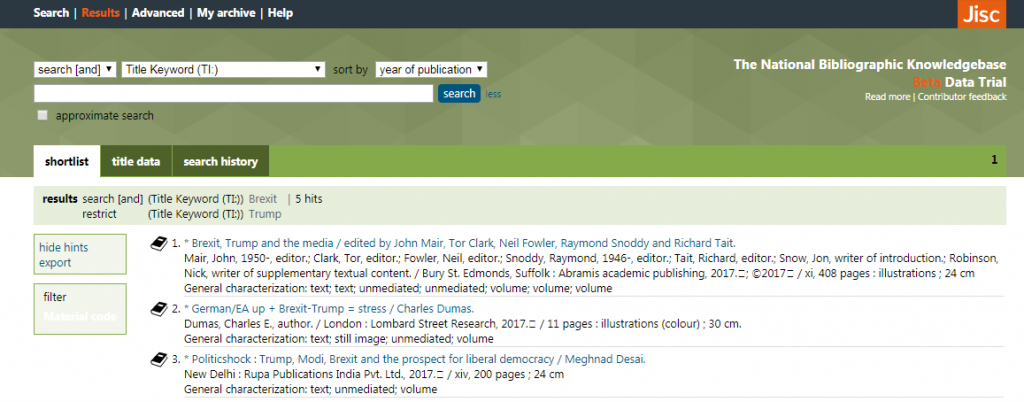The National Bibliographic Knowledgebase (NBK) is a transformative new national service that will aggregate bibliographic data at scale and link with a number of other data sources to help users to more effectively find, access and use print and digital scholarly resources. It will also greatly enhance the ability of libraries to more effectively manage and develop their collections. After a two year development period (alpha and beta phases) we are aiming to launch the ‘live’ service in January 2019.
Phase 1 (Alpha) Complete
Last month we formally got started on phase 2 of developing and building the NBK. There is so much to do, so many meetings to attend and things to discuss, that it’s taken a while to find the time to blog about it.
The first project ‘alpha’ phase of the NBK ran from February 2017 until January 2018 and was principally focused on three main objectives. The first was for OCLC to install a new instance of their metadata management system (CBS) onto their infrastructure and to set it up to begin handling data from UK libraries. The second was for Jisc to get a substantial number of fresh loads of catalogue data from contributing libraries and to pass them across to OCLC for processing. And the third was for Jisc and OCLC to work together to provide a beta interface so that libraries can check their data and the community as a whole can see that progress is being made.
How did we get on? Well … I’m pleased to announce that we have ticked off all three of those first phase objectives.
As of February 2018 we are already loading data from 60 institutions onto the NBK and more than 40 additional institutions have so far signaled their intention to participate.
Take a look at which libraries are participating in this recent NBK slide deck. (2.7MB MS Powerpoint download from the Jisc repository)
There is also a 2 page slightly more detailed summary of progress available. ( 2 page MS Word document download from the Jisc Repository)
Whilst the NBK interface is openly available for all to look at, it is worth noting that it’s very much a “work in progress” and needs more refinement and development. We have made it available in its current form so that contributing libraries are able to take a look at the data they have sent and to work with us to enhance the record matching and processing procedures that are at the heart of the NBK workflow.

The live NBK beta interface is openly available at: https://nbkbeta.copac.jisc.ac.uk
What’s Next for the NBK?
The first thing we have to focus on in the next phase is to continue reaching out to more libraries to invite them to commit data into the system. If you would like your data to feature in the NBK, the first step is very simple. Just drop us a line at: nbk.copac@jisc.ac.uk. We will then ask you some questions about your data and then help you at every stage of the process.
We think that having a comprehensive record of the holdings data of UK academic and specialist libraries in one convenient location is a very compelling proposition but we realise that we need to keep on making the case and offer tangible benefits to convince many libraries to push this activity to the top of their priority list.
The universal benefit for libraries to join in with the NBK is that we want to make UK library data much more discoverable wherever users are trying to find resources. Overall, we want to make a much richer diversity of resources available to researchers and learners so that science and scholarship thrives. But more practically for libraries, our aim is to steer users of the NBK towards library resources and into the library environment.
Another primary use case of the NBK is to enable libraries to make data-driven decisions about the management and development of their collections and to deliver value, savings and efficiencies to libraries and their host institutions. By providing the most comprehensive view possible of the holdings of libraries across the UK, it should become feasible for institutions to more accurately compare and benchmark their collections and to more easily collaborate with others in consortial, regional and national groupings.
We have a number of exciting and challenging tasks to tackle in year 2 of the NBK and we want to work very closely with the community to realise all the potential benefits. We have set up some community data groups to work on issues relating to data quality and efficiency and we are hopeful that they will design tools, advice and guidance that will help libraries align around best practice. (We will be posting more information about these groups when work proposals are agreed).
We are talking to commercial data suppliers to better understand how data enters into and circulates around the bibliographic data ecosystem; and how we might design a data marketplace that is as efficient and as fair as possible.
We will be looking very closely at all of the requirements around user interface design and the component tools and service layers that we can provide over the core aggregation. During the course of this next phase we will develop requirements and implement: a fully featured discovery interface; a contributor dashboard; collection management tools; and catalogue record upload and download components. We will also be paying very close attention to how we most fairly apportion the costs and responsibilities of sustaining the NBK and how this relates to access rights.
The next twelve months will be a busy and highly collaborative period for Jisc and OCLC working closely with academic and specialist libraries. We very much want to hear from you so don’t hesitate to drop us a line if you have any questions about any aspect of the NBK.
write to: nbk.copac@jisc.ac.uk

